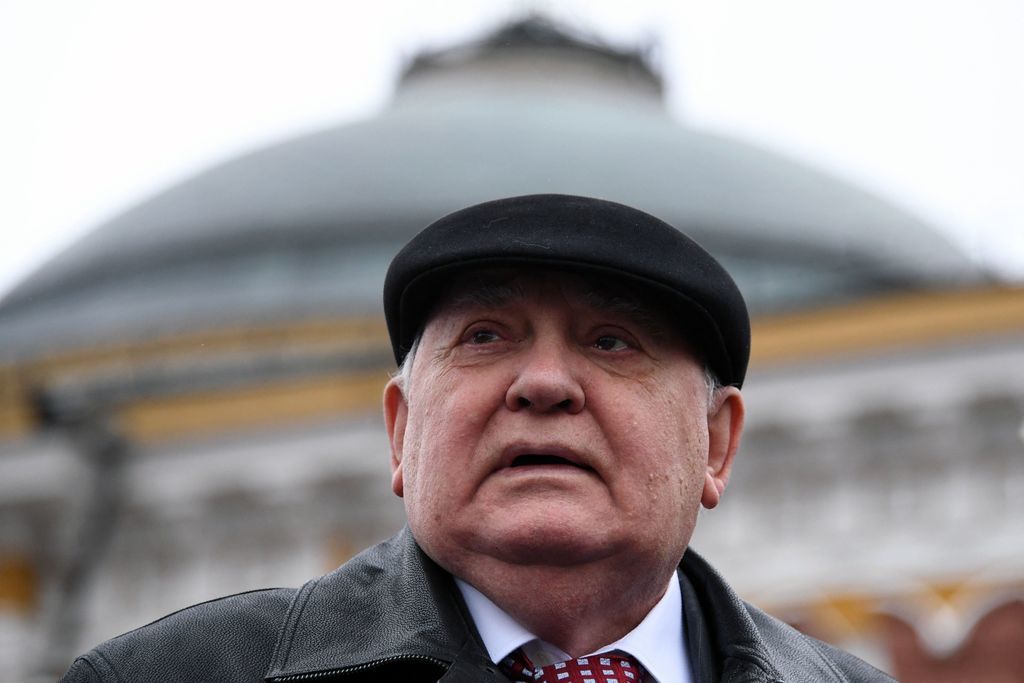
Why Putin could forgive Yeltsin but not Gorbachev
This weekend, the last leader of the Soviet Union, Mikhail Gorbachev, will be laid to rest in the same central Moscow cemetery where Russia’s first president, Boris Yeltsin, is buried.
But unlike Yeltsin, Gorbachev isn’t being accorded the courtesy, fanfare and pomp of a state funeral by Russian President Vladimir Putin. And, the Kremlin says Russia’s leader will not attend the funeral of the man Western leaders praise for helping end the Cold War.
The day of Yeltsin’s funeral was one of national mourning, and the ceremony was broadcast live on Russian state-owned television. At his graveside, Putin noted: “Yeltsin’s path is as unique as the fate of our country, which went through unprecedented transformation and difficult turmoil to defend its state and its right for free and independent development.”
In contrast, the Kremlin waited several hours after Gorbachev’s death before issuing a statement from Putin, and when it came, it was laconic and hardly fulsome. In it, Putin offered condolences to Gorbachev’s family, accompanied by a highly ambivalent compliment as he flatly noted that Gorbachev was “a politician and statesman who had a huge impact on the course of world history” — without clarifying whether it had been good or bad.
Putin’s spokesman Dmitry Peskov filled in the rhetorical gap somewhat, telling reporters that Gorbachev “sincerely wanted to believe” the Cold War would be over and “a new romantic period” would dawn “between the renewed Soviet Union” and Western powers. “Those romantic expectations failed to materialize. The bloodthirsty nature of our opponents has come to light, and it’s good that we realized that in time,” he added.
In other words, Gorbachev had been naive and allowed himself to be tripped up by Western skullduggery — more fool than knave.
Lionized in Western Europe and the United States, Gorbachev has, in many ways, been idealized for mistaken reasons. All too often, he’s identified as a liberal, even though he never wanted the Soviet Union to be dissolved. He urged the Soviet republics to remain in a reformed Soviet Union, sending troops to quell separatists in Georgia, Latvia, Lithuania and Azerbaijan. His reforms weren’t intended to crash the Communist system but to fix it.
For the revanchist Putin, though, Gorbachev was more to blame than anyone else for the dissolution of the Soviet empire — even more so than Yeltsin who signed the Belovezh Accords in 1991, recognizing the independence of Ukraine and Belarus. A dissolution he has dubbed “the greatest geopolitical tragedy of the 20th century.”
Putin took that tragedy and the fall of the Berlin Wall very personally. For him, it was a time of stinging indignity.
As a young KGB officer in Communist East Germany, Putin had a walk-on role in the historic geopolitical drama playing out across Warsaw Pact countries, when some demonstrators besieging a Stasi intelligence building in Dresden broke away and advanced on his KGB installation.
Recalling those last days of Communism many years later, Putin said he warned the protesters off, telling them the facility was a Soviet establishment — there are contradictory reports as to whether he brandished a gun. Calling his superiors to request support, he was bleakly told, “We cannot do anything without orders from Moscow. And Moscow is silent.” And though the crowds did eventually disperse, Putin biographers say the humiliation of that day has stayed with him.
His anger continued to gnaw at him after he left the KGB and was working for St. Petersburg’s mayor Anatoly Sobchak, as became clear in a documentary the ambitious Putin commissioned about himself at the time, in which he complained about the Soviet breakup.
 Mikhail Gorbachev attends the Victory Day military parade at Red Square in Moscow on May 9, 2017
Mikhail Gorbachev attends the Victory Day military parade at Red Square in Moscow on May 9, 2017
Last year, he returned to the theme, scratching at his grievance once more in comments released by Russian state-owned television. Lamenting the demise of what he called “historical Russia,” he said the economic turmoil had impacted him personally. “Sometimes [I] had to moonlight and drive a taxi. It is unpleasant to talk about this.”
Since then, Putin has sought to turn back the clock with increasing urgency, to undo Gorbachev’s legacy by trying to reverse Russia’s regional clout and the territorial losses suffered when the Soviet Union splintered — in large part due to the train of events Gorbachev triggered. And it is this resentment over the Soviet collapse that fueled his decision to invade Ukraine in February.
As one Kremlin insider told me a couple years ago when discussing Yeltsin and Gorbachev, the former could be forgiven — he was just playing the cards Gorbachev had dealt him. And, after all, he had the good sense to pick Putin as his successor. Gorbachev, though, couldn’t be absolved, despite the fact that in recent years, he’s sounded more like Putin, complaining about Western disrespect toward Russia and arguing that the U.S. and Europeans are more to blame for recent tensions than Moscow.
In 2013, Gorbachev told the BBC the collapse of the Soviet Union was a “crime.” And the following year, he supported Putin’s illegal annexation of Crimea, telling the Moscow Times, “While Crimea had previously been joined to Ukraine based on the Soviet laws . . . without asking the people, now the people themselves have decided to correct that mistake.”
Yet, it still wasn’t enough to acquit him — as Putin has made clear by withholding a full state funeral from the man the West praises for ending the arms race, which Putin himself has now restarted.
“Gorbachev is dead,” tweeted Margarita Simonyan, the head of Russia Today and a Kremlin propagandist, upon news of his passing. “It is time to collect the fractured (pieces).”
Apparently, even if that means smashing Ukraine to bits.










